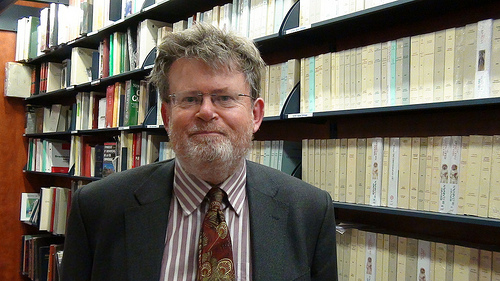
My Learn to Play Bridge program talks to me. Upon entry, “Welcome to Bridge Baron 23.” Upon exit, “Hope to see you again soon.” Mere visuals don’t work because, well, the voice is extraneous, but it’s hard to play a social game in solitude. I’m probably playing it alone, at any given time, only because I can’t find people to play with. The voice acts as an assurance, a psuedo-human element in an enterprise in which the human element could not be more glaringly absent.
The idea of depersonalization occupies us more and more: social media in particular serves as a supreme example of the tension between connection and substation for connection. And within different roles, we’re absorbed by different objective, i.e., antisocial, categories. For instance, on Instagram I may be the Type of Person Who Goes Backpacking. On LinkedIn, I’m a set of depersonalized professional categories – “Associate Editor for Website with X Amount of Readers”, et cetera. Every mode of social engagement comes with categories for success or failure; to be useful, these categories must be objectively defined; in being objective, they lose their particularity, their human-ness. And paradoxically, often things which become less personal must out on ever-greater airs of humanness. My Bridge Baron voiceover wouldn’t necessarily be a bad idea for Facebook – “Welcome to the Social Network”, in HAL 9000’s voice.
Perhaps the main reason my Bridge program should talk, from a marketing perspective, is that it concerns mere technique, and technique is directly opposed to sociality. Because technique implies replicability – the ‘right’ thing to do in any circumstance, by any person – it implies fungibility, too: anyone could be doing this instead of me; my personality and individuality are irrelevant. And the irreplicable particularity of any given individual forms the basis of social encounters – the unity of the different, the self ec-statically encountering its antithesis, something akin to Martin Buber’s “thou”, as opposed to the impersonal, fungible “it”.
It’s more than arguable that to the degree something is general – true in all cases, or better yet, functional in all cases – it loses its reference to the distinct person, and therefore the social which is, paradoxically, built on this distinction. And the more general something is, the more it must include Bridge Baron’s pseudo-personal element to keep it desirable.
Alas, this is not a Bridge Baron review. But the “Hope to see you again soon” example sheds light on the problem of the general versus the particular. Bidding technique is more general because it includes a wide field of possibilities with regard to subject, or actor (in this case bidder), which excludes any reference to or determination by the distinct personality of the one performing the action.
The problem of possibility excluding personality goes deeper. We have, in our contemporary culture, a near-total indeterminacy not, directly, with regard to the actor, but with regard to the action. Freedom, the predominant virtue in our value-system, is defined by an almost-infinite horizon of potential actions. We want as many choices as possible, and any organic tendency to favor one over the other is immediately mistrusted: “How can you know you want to marry someone without dating other people?”, as we’d be tempted to ask a starry-eyed person engaged fresh out of college. Or for someone without their natural, commendable portion of wanderlust, “I want to live in the town where I grew up, but there’s so much more out there I need to see”. Any time we have a definite choice, we tend to rebel; claustrophobia is our greatest fear; we feel trapped by an obvious choice, even when such a choice springs organically from ourselves. And yet this godlike possibility can be paralyzing; we’re so afraid to forfeit it that an inability to commit or take a risk can stay with us well into old age.
One such modern man was famously sketched by T.S. Eliot, a man whose fear of specificity gives him nothing besides speculative musings as to what course events may take in the future, someone so scared to define himself by choices that he ends up having no personality, whatsoever, beyond an attachment to the future. Near the end of his “Love Song”, Eliot’s man futilely dwells on his possibilities:
“Shall I part my hair behind?”, he asks. And quite stupidly, he resolves, “I shall wear white flannel trousers, and walk upon the beach.” It’s a poem which has, perhaps, been misinterpreted as referring to sexual fear and impotence; it does refer to that, but as a symbol of the modern man’s anemic possibilism in general. Sexuality is one realm in which the human self is actualized, specified, and determined par excellence; indeterminacy in this area expresses a more general ailment, the inability of man to self-determine.
The fixation on possibility – whether romantic, professional, or otherwise – is necessarily depersonalizing because it wars against the specificity of actual choice, the ‘something’, as opposed to ‘anything’, which must define us.
Unfortunately, the fixation on possibility comes through in the political writings which have helped define modern liberal democracy as much as it expresses itself anywhere else. For Rousseau, Locke, and others, the State functions to provide the widest range of individual freedoms practically available – and this is an emphasis which has only broadened since those thinkers wrote. In modern terms, we can define a state as ‘minimalist’ which has no express function besides allowing for an expressing the will of the people – no matter what that will may be. Because freedom is defined as the broadest available set of individual possibilities, and these possibilities resist actualization, people become interchangeable, and politics proper is, formally at least, impersonal.
But we crave a social process and, as thinkers like William T. Cavanaugh or Michael Burleigh have demonstrated, the absence of a social political process necessitates a pseudo-social one. Or conversely, a politics focusing only on formal possibility – but devoid of a defined telos – must fill the void with arbitrary pseudo-teleogies, such as racial purity or communist (real) equality, as Eric Voegelin made clear. Thus freedom – if it is defined only formally – is a myth. At worst, the lack of a criterion for how to make choices leads to an arbitrary criterion (as in the case of Weimar/National Socialism); at best, we have merely the paralysis of poor Prufrock, devoid of any purpose save reassuring himself that his wilting freedom does, to some degree, remain.
All this is an extraordinarily long-winded introduction to John Milbank’s latest work, Beyond Secular Order: The Representation of Being and the Representation of the People. Amidst the desocialization of political space, the pseudo-human voices which must speak to us are things like prosperity, security, or opportunity, all things which stoke our kindling sense of individual freedom; the pseudo-human comes through in all the ways our individualism is upheld, such that we are speaking really to ourselves. Milbank wants to unmask the voices of the modern state, thundering with power and promise, to show that the uneasy alliance between individual empowerment and alienation of all powers to the State is an imperfect, contingent, and perhaps contradictory one. This may sound ‘radical’, but any deep questioning of the status quo tends to come across that way. And deep questioning it is: he rips down the curtain over the modern state’s promise and power, and behind it he finds not a wizard, but… weird theology, in particular the figure of 13th-14th century Scotsman Duns Scotus, who was (perhaps misguidedly) beatified three years after the release of Milbank’s famous Theology and Social Theory.
The work is so abstract that it’s hard not to review it ‘back-to-front’ – basically, to find something other than complex metaphysics in which to ground his thought for a non-reader. Our prioritization of possibility over actuality – something he calls ‘possibilism’ – is only one of many places where his work touches down.
In (inadequate) summary, many modern assumptions we take for granted are, as Charles Taylor has pointed out, contingent rather than obvious, necessary, or objective. For Milbank, four pillars of modern philosophy (and, therefore, political thought) are univocity of being, representation rather than identity, possibility rather than actuality, and concurrent causality rather than ‘influential’ causality; each of them can be traced back to theological decisions, many originating with Duns Scotus and William of Ockham. Once this genealogy is firmly established, the theological underpinnings of modern thought can be disputed on theological grounds, which renders these four modern philosophical assumptions questionable. Furthermore, this weakening of modern assumptions opens up space for a counter-metaphysics and counter-politics, based on Milbank’s orthodoxy, to be established.
There’s no need to point out Milbank’s astonishing intellectual originality and breadth of learning. But an equally high compliment, for this volume, is the fact that his arguments cannot really be reviewed in shortened form: Beyond Secular Order, unlike TST, is pared down mostly to essentials; he simplifies his central arguments as much as possible, while cutting much of the fascinating, but at times obfuscating, rabbit trails which characterized his earlier work. That is, this work presents a phase of his thought which is no longer as much concerned with a constellation of arguments growing out of his disdain for Scotus’s univocity and the myth of autonomous secular spaces as it is concerned with saying something quite specific and streamlined. Unfortunately, what exactly this message is must wait for his concrete positive proposal – the planned sequel On Divine Government – but the very anticipation of such concreteness clearly lends a welcome focus to Beyond Secular Order.
We’re concerned here, of course, largely with his third “pillar” of modern philosophy: possibilism. A simple version of the argument runs like this: one way of looking at God is voluntarism, which stresses God’s ab-solute, unpredictable free will – God did not have to create the world as it is; God didn’t have to save us – a view which has the distinct advantage of stressing the utter gratuitousness of God’s favor for humanity and God’s utter sovereignty. Another way, to simplify, is intellectualism: the mind of God is simple and one – ‘how could God have created otherwise? How could God, being God, not choose to save us?’ This view has the advantage of unifying God’s grace closely with the divine character, and of safeguarding revelation as something which does, in fact, give us knowledge of God himself – not just arbitrary divine action. Ideally, theology should keep these two ways of looking at God in close unity: God’s freedom means God’s ability to act as God, which assumes a specific form, specific actions.
 Scotus wanted to stress God’s total freedom, which meant God’s ability to act in any way whatsoever, at any time. The divine will embraces all possibilities, and only as a second movement does it choose how to express itself. For Milbank, this view of divine freedom in-formed the way humans think about our freedom, such that freedom – to be true freedom – must be capable of acting out any possibility whatsoever, a freedom unbound by the particularities of our characters and dispositions. From here, one can begin to extrapolate toward a nation-state which is unconstrained by any direct purpose, but which exists only to guarantee individual freedoms, which themselves are indeterminate and arbitrary. And once that modern assumption is exposed as questionable, returning to a more orthodox (generally defined as Milbank’s reading of St. Thomas) metaphysic, and therefore a more sound politics, becomes possible.
Scotus wanted to stress God’s total freedom, which meant God’s ability to act in any way whatsoever, at any time. The divine will embraces all possibilities, and only as a second movement does it choose how to express itself. For Milbank, this view of divine freedom in-formed the way humans think about our freedom, such that freedom – to be true freedom – must be capable of acting out any possibility whatsoever, a freedom unbound by the particularities of our characters and dispositions. From here, one can begin to extrapolate toward a nation-state which is unconstrained by any direct purpose, but which exists only to guarantee individual freedoms, which themselves are indeterminate and arbitrary. And once that modern assumption is exposed as questionable, returning to a more orthodox (generally defined as Milbank’s reading of St. Thomas) metaphysic, and therefore a more sound politics, becomes possible.
So that particular genealogical strand is an example of Milbank’s method; he made similar arguments in TST, but they usually functioned to expose the myth of presumably autonomous and neutral academic disciplines, such as sociology. Here, his arguments all pull together toward establishing a new politics, and they all speak to each other, reflect on one another. If they read at times as too specialist or abstruse, that’s often because he wants to be as thorough as possible in his critiques, to definitively clear space for his (largely forthcoming) political proposal.
The places where he sketches out the beginnings of his alternative view are quite moving, and they often require doing theology directly, a task at which Milbank displays characteristic aptitude. His dialogues with Augustine, especially De Trinitate, as well as with Suárez, Luther, Calvin, and others are fascinating, and at times his theological sketches are even moving, speaking as a Christian, even if he is, at times, too dismissive (I think immediately, here, of Martin Luther and Jean-Luc Marion).
The weaknesses of the book are few: he could perhaps consider the validity of modern philosophy apart from its shaky 13th-century origins, and he could, perhaps, also consider the decisive role played by historical event, e.g., the Black Plague or increasingly fluid socio-economic strata. But as both fall largely outside the bounds of his genealogical history-of-ideas method, they’re not so much imperfections as signposts for further dialogue with his work.
As far as non-academic, non-political theory contributions from the work go, they’re largely left to the reader to extract. His musings on personality and embodiment come to mind, as does his critique of possibilism, as both these factors can speak to everyday life as much as to metaphysics and politics. And from a ministry standpoint, it’s a pastor’s or lecturer’s duty to take the rich intellectual material presented here and make it accessible to lived experience. The sometimes-touching emotional element of his abstract theology subtly reveals the truth that any issue in philosophy or theology does bear practical implications, and can even prove medicinal – the ultimate unity of Truth with Goodness and Beauty points to this comfort. But as Truth involves, at times, rather dense metaphysics or epistemology, so too might comfort. That is to say, a Savior hanging on a cross is all the comfort a suffering world needs, but that Person’s identity as Word means that the Christian responsibility is not only to communicate salvation but, through it, to communicate truth about the world. One touchstone for this truth, for pastors, would his thorough deconstruction of our fixation on possibility, the silencing of the pseudo-human voice affirming our identity is coterminous with our freedom.
There is a kind of ‘good possibility’, too, a freedom-for: the possibility that what we know of the world is fragmented and ‘through a glass darkly’, and Milbank’s view is no exception to this. Our knowledge is partial, participatory – and as such, it bears room for growth, along not arbitrary but teleological lines, toward truth. Along that trajectory towards truth, Beyond Secular Order makes us critically reexamine our deviations, but the work’s real promise lies in its pushing onward, toward its own constructive vision. Such a vision is partial and imperfect, but it’s a signpost that, as we continue to watch modern metaphysics and politics develop, will be an important critical and constructive dialogue partner for a long time to come.

COMMENTS
Leave a Reply















